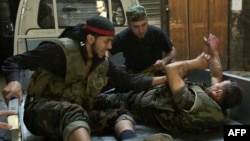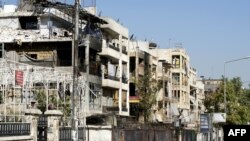CAIRO —
Syrian government forces captured several rebel-held districts in the capital Damascus Friday, as the rebels went on the offensive against government troops in the northern city of Aleppo.
Rebel fighters clashed with government forces in at least a half dozen districts of Aleppo, on the second day of a rebel offensive. Witnesses say the rebels have been unable to gain much ground, and state TV claims heavy rebel casualties.
Rami Abd al-Rahman of the opposition Syrian Observatory for Human Rights said that clashes in Aleppo have engulfed much of the city and that government forces are shelling the rebels to prevent them from advancing.
Al-Rahman said that parts of Aleppo are being shelled, amid clashes on front lines between rebel-held territory and districts held by the government. He said that especially heavy fighting is reported in a Kurdish district under government control.
In Damascus, government troops stormed three rebel-held districts amid heavy exchange of gunfire. Tanks and armored vehicles pushed into the areas as government troops searched houses, making arrests.
Heavy street fighting was also reported inside the eastern oasis town of Deir Ezzor for a second straight day. Amateur video showed rebel fighters trading fire with government troops along streets strewn with rubble and burned-out vehicles.
Apparent stalemate
Middle East analyst Timor Goksel, who teaches at the American University of Beirut, said that the military situation in Syria now appears to be at a stalemate.
"As long as one of the sides doesn't admit that they are hurting [and] nobody admits that he is hurting at the moment, so if the country is being destroyed, at one point somebody has to say 'that's enough, we have to stop this,' he said. "But, at the moment, nobody seems to be willing to say that. But, in the meantime, they are destroying their country.”
Goksel said that the government continues to “have the upper hand in firepower and in the air,” so it is “not going to lose the battle on the ground,” while the rebels now appear to be “better armed and slightly better organized.”
Protests against the government were also reported after Friday prayers in the northern town of Binesh, and at least a dozen other Syrian towns and cities.
Chemical weapons vulnerable
During a briefing at the Pentagon, U.S. Defense Secretary Leon Panetta said there is evidence the Syrians are worried some of their chemical weapons might be vulnerable.
"There has been some intelligence, that in regards to some of these sights, that there has been some movement for the Syrians to better secure the chemicals," he said.
Panetta said Friday the major chemical weapon stockpiles appeared to be intact, but that concerns remain.
"But as to the movement of some of these materials and whether or not they've been exposed to possession by the opposition or others, that's something I don't really have firm information on," he said.
Meanwhile, the United Nations human rights council Friday expressed renewed concern about abuses by both government and rebel forces, extending the mandate of its war crimes inquiry by six months.
The U.S. ambassador to the council, Eileen Chamberlain Donahoe, says the situation in Syria is dire.
"Assad continues to cling to power and his campaign of brutality has sparked a deepening humanitarian crisis," she said. "We cannot afford to be silent."
The council also appears poised to take an even harder line against the abuses in preparation for potential war crimes trials.
The human rights body Friday named renowned former U.N. war crimes prosecutor Carla del Ponte to the investigative team.
The investigation has already interviewed more than 1,000 victims, refugees and defectors but has not been granted access to Syria itself.
Also Friday, selected members of the Friends of Syria group is scheduled to meet in New York, hosted by U.S. Secretary of State Hillary Clinton. It will include ministers from more than 20 nations and representatives from local revolutionary councils.
A senior State Department official said the meeting, which takes place on the sidelines of the U.N. General Assembly, will focus on support to the Syrian opposition, humanitarian assistance and international pressure on the Syrian regime.
The official says the discussions will include unilateral measures which can be taken against the regime including the possibility of sanctions.
Rebel fighters clashed with government forces in at least a half dozen districts of Aleppo, on the second day of a rebel offensive. Witnesses say the rebels have been unable to gain much ground, and state TV claims heavy rebel casualties.
Rami Abd al-Rahman of the opposition Syrian Observatory for Human Rights said that clashes in Aleppo have engulfed much of the city and that government forces are shelling the rebels to prevent them from advancing.
Al-Rahman said that parts of Aleppo are being shelled, amid clashes on front lines between rebel-held territory and districts held by the government. He said that especially heavy fighting is reported in a Kurdish district under government control.
In Damascus, government troops stormed three rebel-held districts amid heavy exchange of gunfire. Tanks and armored vehicles pushed into the areas as government troops searched houses, making arrests.
Heavy street fighting was also reported inside the eastern oasis town of Deir Ezzor for a second straight day. Amateur video showed rebel fighters trading fire with government troops along streets strewn with rubble and burned-out vehicles.
Apparent stalemate
Middle East analyst Timor Goksel, who teaches at the American University of Beirut, said that the military situation in Syria now appears to be at a stalemate.
"As long as one of the sides doesn't admit that they are hurting [and] nobody admits that he is hurting at the moment, so if the country is being destroyed, at one point somebody has to say 'that's enough, we have to stop this,' he said. "But, at the moment, nobody seems to be willing to say that. But, in the meantime, they are destroying their country.”
Goksel said that the government continues to “have the upper hand in firepower and in the air,” so it is “not going to lose the battle on the ground,” while the rebels now appear to be “better armed and slightly better organized.”
Protests against the government were also reported after Friday prayers in the northern town of Binesh, and at least a dozen other Syrian towns and cities.
Chemical weapons vulnerable
During a briefing at the Pentagon, U.S. Defense Secretary Leon Panetta said there is evidence the Syrians are worried some of their chemical weapons might be vulnerable.
"There has been some intelligence, that in regards to some of these sights, that there has been some movement for the Syrians to better secure the chemicals," he said.
Panetta said Friday the major chemical weapon stockpiles appeared to be intact, but that concerns remain.
"But as to the movement of some of these materials and whether or not they've been exposed to possession by the opposition or others, that's something I don't really have firm information on," he said.
Meanwhile, the United Nations human rights council Friday expressed renewed concern about abuses by both government and rebel forces, extending the mandate of its war crimes inquiry by six months.
The U.S. ambassador to the council, Eileen Chamberlain Donahoe, says the situation in Syria is dire.
"Assad continues to cling to power and his campaign of brutality has sparked a deepening humanitarian crisis," she said. "We cannot afford to be silent."
The council also appears poised to take an even harder line against the abuses in preparation for potential war crimes trials.
The human rights body Friday named renowned former U.N. war crimes prosecutor Carla del Ponte to the investigative team.
The investigation has already interviewed more than 1,000 victims, refugees and defectors but has not been granted access to Syria itself.
Also Friday, selected members of the Friends of Syria group is scheduled to meet in New York, hosted by U.S. Secretary of State Hillary Clinton. It will include ministers from more than 20 nations and representatives from local revolutionary councils.
A senior State Department official said the meeting, which takes place on the sidelines of the U.N. General Assembly, will focus on support to the Syrian opposition, humanitarian assistance and international pressure on the Syrian regime.
The official says the discussions will include unilateral measures which can be taken against the regime including the possibility of sanctions.





